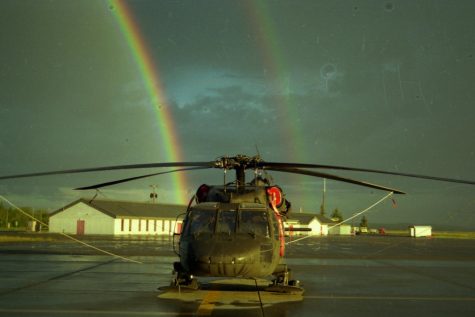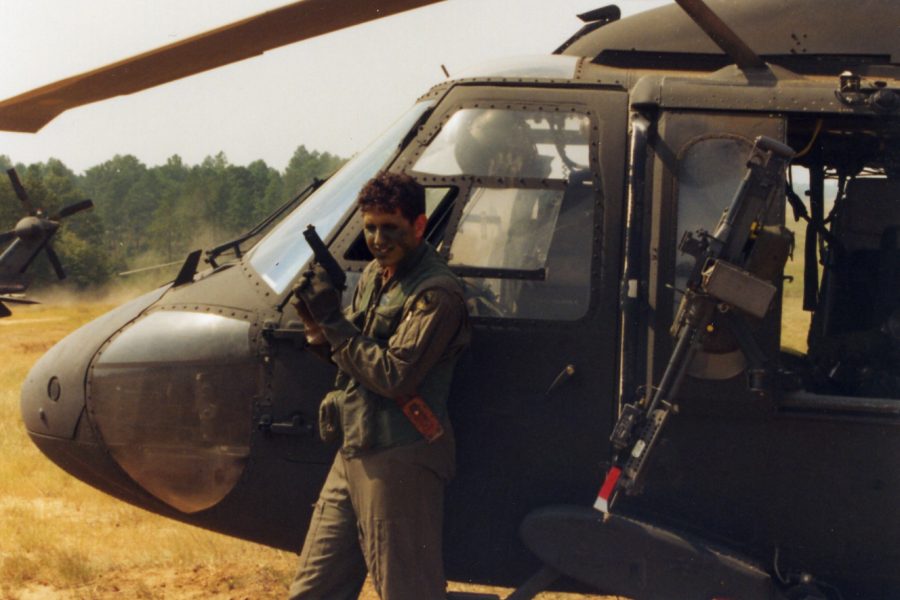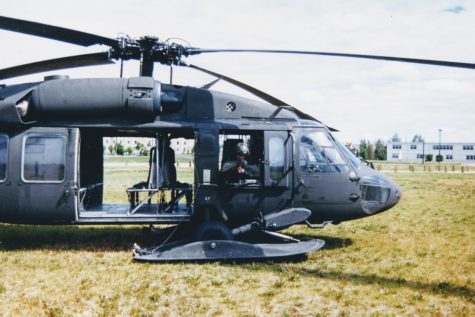Not only a world history teacher and girls soccer coach, Sergeant Charles Johnson served in the U.S. Army from 1992-1998.
Sergeant Charles Johnson
Name: Sergeant Charles Johnson
Military Branch: United States Army
Dates of Service: 1992-1998
Q: What led you to serve in the military?

A: From the time I was real young, I wanted to actually go to the Air Force. In fifth grade, I remember doing a project about what I wanted to be when I grow up where I wanted to be an F-15 pilot. Going through high school, that’s what I wanted to do is go be a pilot, but that meant I had to college, and I wasn’t really ready for that. So, I went to the army—where they have more air craft helicopters than the air force—and I became a crew chief. I just wanted to fly. That sense of serving—my grandfather was in the Navy, my dad was in the Navy—we have always served. I’m very patriotic, and that was never something I didn’t think about.
Q: What is your rank, and where did you serve?
A: I was a sergeant (E5), and I was stationed in Virginia, New York, Alaska and South Carolina. I never went to Iraq; I was fortunate enough to serve at a time where there was no real conflicts we were deployed to. You meet a lot of people from all over the country—all over the world—and it’s such an eye-opening experience.
Q: Describe the most memorable moment of your service.
A: Oh gosh, there is a lot of things. I really enjoyed my time. My uncle actually served in the Air Force and got out and served in the Coast Guard, and he always told me, “Your attitude toward what you do is going to make it fun or not.” I always tried to have fun in everything we did. There were times we got Humvees stuck; we caused a lot of trouble, but I am still friends with a lot of guys from the army. Being with that group of people who are outgoing and really willing to put their life on the line—not that we ever served in that capacity—you knew if you got that call, you could trust those people. So, doing that with them was a big deal.
Q: How did your time in service impact your life?
A: I grew up a lot while in the army. I grew up fairly poor, and it’s okay to grow up in that environment; you can still be something. I grew up without a dad really. He was gone a lot, and my mom and dad divorced when I was three, so my grandfather was my male role figure growing up. He wasn’t in the household, so he didn’t necessarily teach me how to be a man and take responsibility, so the Army really gave me structure and gave me the idea I can do what I want and do what I want if I put my mind to it. And eventually, I became a sergeant, where I had to teach other guys that. So it really impacted me in a huge way, especially as a coach. By the time I became a sergeant, I was coaching other guys up on their job and life. They are 17 and 18-year-old kids joining the Army who needed the same structure I did when I was 17 and 18.
Q: How has your service impacted your job?
A: For me, it is teaching. The VA [Veterans Affairs] payed for all my college, and they asked me what I wanted to do. Of course, the big thing was “make a bunch of money.” So, my original degree was in business, and it was boring. It wasn’t something I could see myself doing long-time. I taught in the Army in different capacities, and growing up, I had teachers and coaches who had a big impact on me, so those experiences combined drove me to change my degree and become a teacher, and I love teaching.
Q: What does Veterans Day mean to you?
A: I like to reflect a lot. I do have friends who have passed away in Afghanistan, and I am grateful for what we have as a country. I try to teach my kids to be thankful, and for Veterans Day, to be thankful for what we have. You look around the world, and there are so many conflicts. But our veterans keep us safe. On a daily basis, we are able to go to school; we are able have dances, and work and we get to live free, whereas there are war-torn countries that have struggled, so the day means a lot to me.

